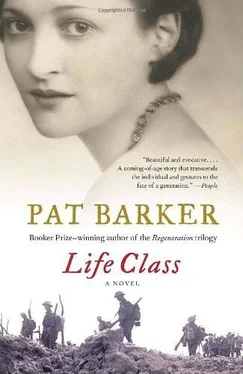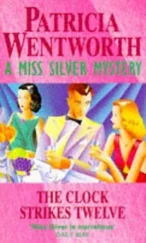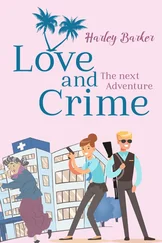‘Which hut?’
‘Yours. It’s the only spare bed.’
Paul wants to point out that the bed in his hut isn’t exactly spare, that the ambulance drivers sometimes use it, but it’s already too late for that. They’re all moving off again, back to the scrubbing room and from there into theatre. He understands, or at least nobody contradicts the idea, that he’s to leave what he’s doing now and go to the station — a ten, fifteen minutes’ walk away — and meet the eight o’clock train. It’s a break, at least. He has no quarrel with that.
Outside, in the darkness of the yard, there’s an ambulance crew, also drinking cocoa, leaning against the canvas side of their vehicle. He passes close by, grunts in acknowledgement of a raised arm, and heads off to the station. It’s muddy underfoot, and cold, but fresh after the hot, steamy air of the sterilizing room. Rain falls on his face. He shivers, and a cold sweat starts up. Within minutes his armpits and groin are drenched, his feet swimming inside his boots. Nothing to do with illness or even change of temperature, this sweat; everything to do with being plunged into the normal world. He stumbles, nearly falls. Every step now brings him further out of the trance. He pauses. Lets his shoulders relax: He’s waking out of his trance into the real time of the outside world.
On his left, there’s a goods train — its doors gaping open — and that shields him from the worst of the wind and rain. He walks along beside it, until, straight ahead, he sees the station and hears a man’s voice making announcements. All the time he’s coming back to himself.
The blue-painted lights of the railway station loom out of the dusk. He remembers the streets of London, walking through them that night with Elinor. All Europe now, he supposes, exists in this indigo twilight. Going into the station, he finds the platform crowded. Men, women, children — all waiting for the train. Eight hours he’s been on duty. Long enough for the sound of a child’s voice to be shocking.
Five to eight. If the train is on time, he won’t have long to wait. He stands near the ticket barrier, stamping his feet to restore the circulation. A little girl stares at him and he smiles at her, but she clasps her mother’s hand tighter and walks on, looking back at him over her shoulder. Perhaps pain, even other people’s pain, becomes a smell you carry round with you?
A rumble in the distance, the light on the line shivers and a single blue eye appears, advancing towards them. Mothers pull their children back from the edge. A belch of smoke and steam and then the engine roars past, snorts, sighs several times, subsides into silence.
All along the train’s length doors open and people spill out. Passengers greet friends, kiss, shake hands, ask and answer questions, pick up bags, begin to drift towards the exist. Soon the platform is almost clear and still no sign of the man he’d come to meet. Then, out of the darkness and the drifting smoke, a figure emerges and strides towards him.
Paul’s first thought was, he won’t last five minutes. He was looking at a gangly boy, all arms and legs. A sprinkle of freckles all over his face gave him a slightly surprised look, like somebody caught in a shower. Close to, there was something about his expression — not just youth and inexperience, something else — that made Paul uneasy. He felt irritated. He’d become rather good at coping with the work, but having a hut to himself had been an important part of that process. Now, he’d have to share it with this freckly-faced schoolboy — deal with his questions, his incomprehension, his shock. Everything that Paul had felt when he first started, and no longer permitted himself to feel.
He held out his hand. ‘Hello, I’m Paul Tarrant. Sister Roper asked me to meet you.’
‘Hello. I’m Richard Lewis.’
A deep baritone — surprising, it didn’t go with his appearance. Lewis was staring at him. Paul looked down at his tunic, which had bits of blood-stained gauze stuck to it. He picked off the bits and let them drop.
‘Good journey?’
‘Not bad.’
Lewis was pink and excited, not at all tired from the journey, swinging a big, heavy bag from hand to hand.
‘I expect you’ll want to get rid of that.’
‘How close are we to the hospital?’
If Paul had been capable of smiling he’d have smiled then.
‘Not far.’
They walked along beside the track, in silence. The path was thronged with weeds. Their boots swished through the long stalks, shaking off raindrops that flashed silver in the moonlight. Even with the moon it was hard to see the way ahead.
‘I hope you’ve brought a torch?’
‘Yes, in here.’ Lewis swung the bag to his other hand. ‘How long have you been here?’
‘A month.’
‘Oh. So you know the ropes, then?’
Paul didn’t bother to reply.
Five minutes later they were approaching a row of huts. He stopped at the third one along. ‘Here we are.’
The door opened straight into the only room. Inside there was a puddle of wet footprints where somebody, one of the ambulance drivers probably, had come in and gone out again. Because he’s showing the hut to Lewis he’s forced to see it again himself. Two iron beds covered in brown blankets, a table with an oil lamp, two chairs. Nothing else, except a candle on the floor between the beds.
The huts had been assembled quickly, not intended to last more than a couple of months. Like everything else around here, they reek of creosote.
Paul groped his way across to the table and lit the lamp. The flame fattened. Walls, chairs, table, beds seemed to take a leap upwards, as if the hut was startled by its own squalor.
Lewis, looking puzzled, stared around him.
‘You’d best take that bed.’
Paul pointed to the bed nearest the door. The draughtiest and least comfortable of the two. Nothing like round-the-clock attendance on wounded and dying men to expunge the last traces of altruism. The bed was tightly made up in the hospital style, the ends of the coarse, brown blanket neatly mitred and tucked in.
Lewis swung his case up on to the bed. ‘It must have been rather nice having it to yourself
‘I don’t mind. It’s not as if I spend a lot of time here anyway. Do you want to have a rest now, before you go over?’
‘No, I’d rather get stuck in.’
‘Right, then. Off we go. Your first sight of the Shambles.’
Lewis looked blank.
‘The hospital.’
‘Oh, I see. Sorry.’
He thought it was a joke. Despite his eagerness to get going, he lingered for a moment by the door, staring from table to chair to bed and back again, willing it all to go away, so he could start again and have the experience he’d been expecting. He looked lost, standing there in his smart uniform.
Again the wave of irritation.
‘You didn’t think of enlisting, then?’
‘I’m a Quaker.’
‘Sorry, I didn’t realize.’
‘Why should you? We don’t wear uniform. What about you?’
‘Tried, wouldn’t have me.’
‘Were you very disappointed?’
‘At the time, yes. Not now. I mean everybody I know who’s enlisted is still in England.’ He turned the lamp out. ‘Strange, isn’t it? The only reason we’ve got this close to the front is because I can’t fight and you won’t.’
That came out hostile, though he hadn’t meant it to.
‘How close are we?’
‘About two miles.’
‘I thought I heard the guns.’
‘Probably. It’s a bit like the trains, after a while you don’t notice them.’ For a moment he was back in bed with Teresa, listening to a goods train rumble past. ‘You can tell if it’s really bad, the lamp jumps up and down.’
‘So it’s quiet now?’
Читать дальше












